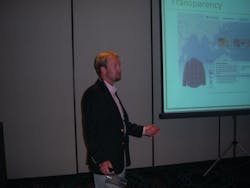Attendees Learn About Green Product Marketing During Coffee, Tea And Water Show In Las Vegas
Sustainability is an important topic to U.S. businesses today, and the demand has made it important for service providers to know what makes a product sustainable. In response to the need for more information on this topic, the National Automatic Merchandising Association hosted a session on sustainable green product marketing during its CoffeeTea&Water Show in Las Vegas, led by Wendell Simonson, director of marketing at Boulder, Colo.-based Eco Products Inc.
Simonson, whose company distributes renewable and recycled foodservice products nationally, began by defining sustainability as follows: “Meeting the needs of present generations without compromising the ability of future generations to meet their own needs.”
Simonson said businesses buy “green” products because they believe in it themselves, they believe their customers care about, or a combination of the two. He said most companies buy green thinking their customers care about it enough to affect their buying decisions.
Simonson said companies that offer green products face a big challenge in educating themselves and their customers what products actually qualify as sustainable. He said a lot of incorrect information has been released about this, in some cases from product suppliers.
“It’s just really difficult to control all the informational inputs,” he said.
Simonson said many things that are said for public consumption about recycling don’t make sense.
“Once you install confusion into this mix, you’re kind of lost,” he said.
He noted that some cutlery characterized as compostable has been shown to contain some plastic, meaning it can’t be sold as being 100 percent compostable.
In some cases, the shape of a product influences whether or not it is recyclable.
Simonson urged his listeners not to assume that suppliers always provide accurate information about products. “Assume that your customers know more than you do,” he said.
To win credibility, Simonson encouraged his listeners to be transparent to the public about who they are and what they do. The more a customer knows about you, the more they will trust you, he noted.
Patagonia, the apparel retailer, is a company that has made it a point to be transparent about sustainability, Simonson said. He noted the company has made environmentalism one of its core values.
Simonson said his own company, Eco Products Inc., demonstrates the life cycle of its products through the supply chain.
He noted that government regulations are becoming more specific about what can be sold as “green.”
“The FTC (Federal Trade Commission) is playing a role in what green marketers are allowed to say,” Simonson said.
He said the FTC requires a product to be accepted as compostable by 60 percent of the municipalities in the market to be considered compostable.
Simonson said his company has found a growing opportunity for its products from customers that have come up with their own mandates for compostable products.
He said “green” products will be selected by customers if they bring more value than other products. This is often determined by someone within the customer’s organization. “There are almost always individual champions we work with in our large accounts,” he said. “The desire to create that change is almost always proactive.”
During the question and answer period, Simonson commented that he was impressed by the number of specific questions he received from the listeners.
One issue that some audience members noted is the lack of commercial compacting facilities available to them.
When asked what happens to a compostable cup in a landfill, Simon said it is “landfill stable.” “Our items are landfill stable,” he noted.
When asked about new water bottles that are reportedly biodegradable, he said most PET bottles are recyclable.
